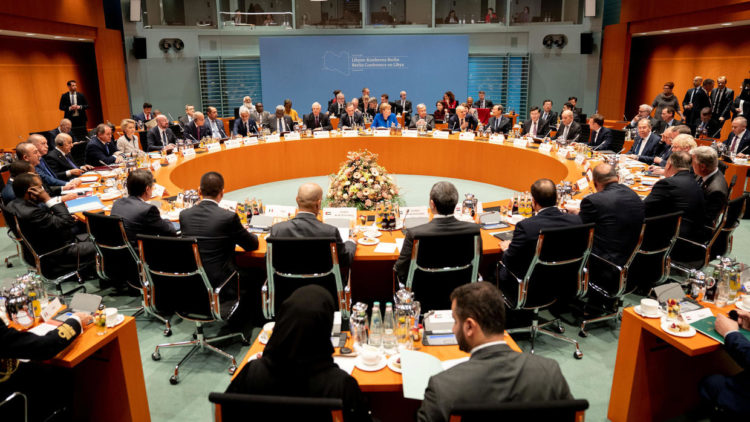Berlin conference: a first step from war to peace

Four international organizations and twelve countries participated in the conference, including the five permanent members of the Security Council. Nine of them were represented by heads of state and government. Also, it’s the first time that President Putin’s participation was a key factor that encouraged other leaders to attend.
Berlin conference into an “international summit” on Libya. This helped facilitate a consensus among the different parties and the convergence of conflicting positions, even within Europe countries like France and Italy.
The conference in Berlin of 11 countries was aimed at bringing an end to the fighting between the UN-recognized government in Tripoli led by the prime minister, Fayez al-Sarraj, and the Libyan National Army in the country’s east led by Gen Khalifa Haftar. The conference plays a role in transforming relations between Russia’s and Turkey, Russia’s will remain central in pushing the settlement in Libya.
Through the conference the world leaders seeking an enduring ceasefire in Libya have agreed at a summit to impose sanctions on those breaking an arms embargo and are considering whether to send a multinational force to Libya as before.
In addition, the second main goal was to get foreign powers wielding influence in the region to stop interfering in the war – be it through weapons, troops or financing. Moreover, the conference has stopped the escalation of the crisis and prevented it from turning into a full-scale war. Turkey’s move to send troops to support Fayez Serraj, the head of the Government of National Accord, would have prompted Egypt to pursue the same course of action to support the Libyan National Army (LNA) and Marshal Khalifa Haftar.
European initiatives stopped the Russian ceasefire on January 12th succeeded in defusing this crisis, and the conference supported this approach. The German foreign minister, Heiko Maas, said: “We have to make sure Libya doesn’t become a second Syria.” There are serious concerns that signatories to the summit’s declarations will do little to abide by the agreements.
The third important outcomes were in confirming the necessity of establishing a truce between the warring parties in Libya especially a message to Turkish President Recep Tayyip Erdogan that both European and international parties would not allow him to threaten their interests. What he did in northern Syria cannot be repeated in Libya.
The fourth result Libya needs credible, verifiable, sequenced and reciprocal steps, including credible steps towards the dismantling of armed groups and militias by all parties as per art. 34 of the LPA and referred to in UNSC resolutions 2420 and 2486, leading to a comprehensive and lasting cessation of all hostilities including air operations over the territory of Libya. In addition, we must take into consideration call for the institution of confidence-building measures, such as the exchange of prisoners and mortal remains.
The fifth result to implementation of UNSCR 2368 and other relevant resolutions concerning ISIS and designated individuals, groups, and entities, in particular the provisions related to the travel, also enhanced cooperation to counter the foreign terrorist fighter threat in accordance with UNSC Resolution 2322. Member States to commit to supporting the provision of the United Nations Support Mission to Libya (UNSMIL) in line with UNSC Resolution 2486 (2019) with the necessary personnel and equipment to effectively support the ceasefire.
The sixth result we encourage the full, effective and meaningful participation of women and youth in all activities relating to Libya’s democratic transition, conflict resolution and peacebuilding, we urge all Libyan parties to further engage in and support mediation and reconciliation efforts between Fezzan local communities so as to reconstruct the social fabric in an area long neglected, they underline the important role of neighboring countries in the Libyan stabilization process.
Finally, the final statement of the conference is to be presented to the UN Security Council for approval and a binding resolution. This includes a monitoring mechanism for following up on the implementation of the promised commitments, which will start in early February.
Furthermore, it launches a direct dialogue between the Libyan parties in three basic respects. It addressed the military aspect through the formation of a committee (5+5) comprising of five representatives for each Libyan party, Al-Sarraj’s GNA and Haftar’s LNA. It will discuss the detailed issues related to the ceasefire.
In the other side, the economic aspect will deal with the Libyan Central Bank, the distribution of oil revenues, and the management of oil fields. Berlin Conference on Libya plays an important role, the commitments will act activities will be key, as well as identification of precise indicators, roles and responsibilities, not only for the United Nations but also for the participants themselves as well as potentially other Member States and international organizations.
How to submit an Op-Ed: Libyan Express accepts opinion articles on a wide range of topics. Submissions may be sent to oped@libyanexpress.com. Please include ‘Op-Ed’ in the subject line.
- Berlin conference: a first step from war to peace - January 21, 2020
- Khalifa Haftar: Is he still the strongest man in Libya? - May 30, 2019


